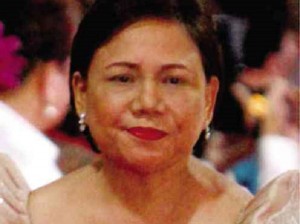Party time
It’s almost funny when you think about it. The Philippines’ oldest political party, enjoying a new lease on life in the 21st century, will not and cannot choose its candidate for vice president.
Among Nacionalista senators Alan Peter Cayetano, Ferdinand Marcos Jr. and Antonio Trillanes IV, “who will you choose?” Sen. Cynthia Villar raised the question on behalf of her husband, the business tycoon and former Senate President Manny Villar, who revived the fortunes of the Nacionalista Party when he took over from former vice president Salvador Laurel. “It’s hard to choose. It’s like there is favoritism.”
It is a long way from the 1965 party convention, when a contest between the incumbent vice president, Emmanuel Pelaez, and the recently joined member, Ferdinand Marcos, settled matters in dramatic fashion. (The number of votes Marcos received, whether through luck or carefully calibrated stage management, was 777—beginning Marcos’ long fascination with “his” lucky number.)
Even though political parties then still depended on the fortunes of wealthy politicians and their business partners, the organizations themselves could not be said to depend on the largesse of any single individual. There were more seats at the grownups’ table. The political scene after the restoration of democracy in 1986, however, turned out differently. More mainstream political parties and coalitions have emerged, but many of them depend on a single business fortune (the Nationalist People’s Coalition, the Nacionalista Party) or a single favored politician (the People’s Reform Party, the Pwersa ng Masang Pilipino, and so on).
The truly interesting development: Once the party’s dominant political figure has ended his political career, the party becomes less of a house, where discipline is enforced, and more of a tent, where almost anything goes.
The NPC was formed when business tycoon Eduardo Cojuangco Jr. sought the presidency in 1992. After his loss, and his return to San Miguel Corp., he largely left the running of the still very influential party to his lieutenants. Part of the reason the party’s influence has not waned is its open-door policy; except for one election, the party members are essentially free to choose which presidential or vice presidential candidate to support.
The same thing has happened to the Nacionalistas.
After Villar’s presidential campaign in 2010, the party has adopted a largely open policy. Hence, the phenomenon of a party declaring itself a “free zone.”
“Free zone,” Mrs. Villar said. “We will help [the three Nacionalista senators contemplating a run for the vice presidency]. Maybe some of our members will choose on their own whom to support.” This way, “no one will feel hurt since the party did not side with anyone.”
The politics of accommodation is not limited to the NPC or the Nacionalistas. Even a party-list group like Bayan Muna can join forces with former political enemies—such as ousted president Joseph Estrada, whose ouster Bayan Muna and its related parties supported. The political left will call this an example of united-front politics, but it’s really just traditional politics: I scratch your back, you scratch mine.
Traditional politics is not limited to parties out of power. Even the Liberal Party, which has a fair claim to having progressed the farthest on the road to professionalization, saw fit to limit the choice of presidential candidate in 2010 to two persons: the erstwhile leader Mar Roxas, and the ascendant Benigno Aquino III. The same thing is happening today; the most important decisions in the Liberal Party are made, not by a party convention or assembly, but by one or two persons, consulting with perhaps a few others.
This means that political parties in the Philippines are not in fact representative organizations, such as the thriving parties in the German political system, but loose groupings for (sometimes temporary) political convenience. What progressive principle justifies Bayan Muna’s embrace of Estrada? Which rational value justifies the Nacionalista Party allowing three of its senators to contest the same national position? We’d be laughing if we weren’t crying.





















